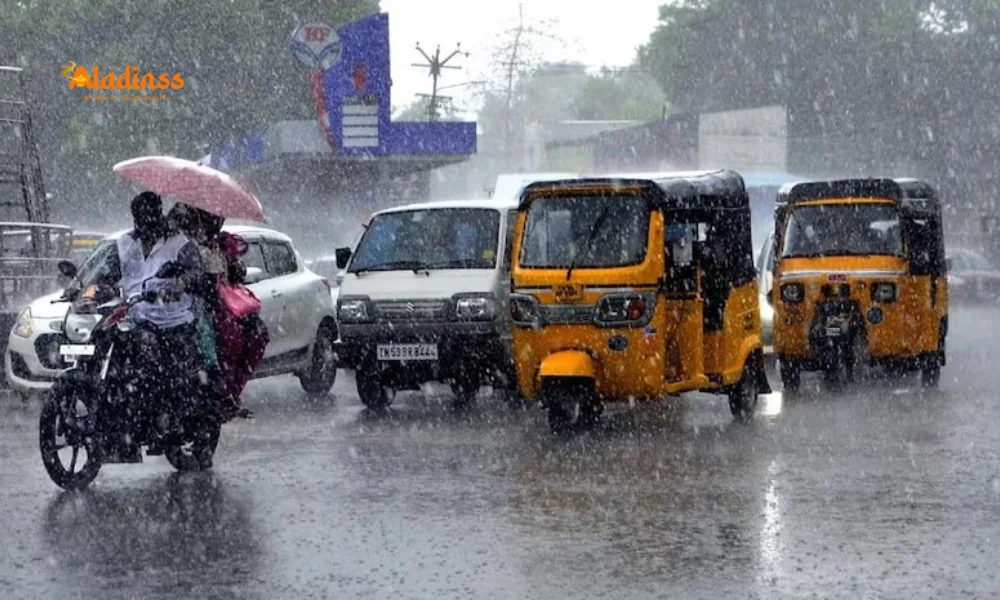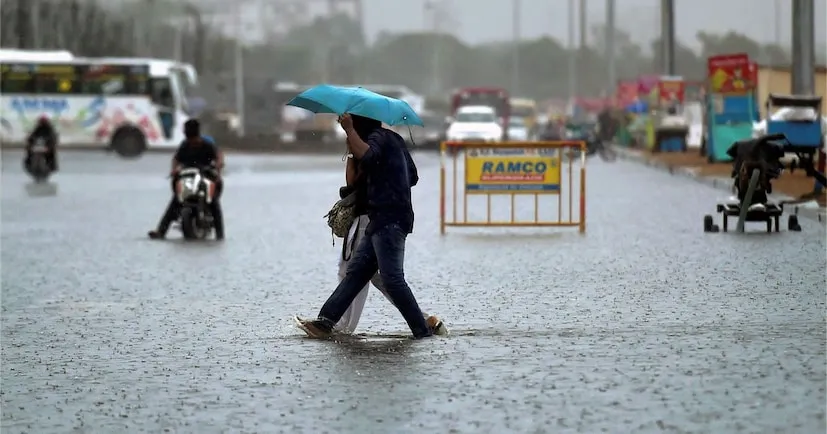Heavy Rain Alert Issued for Tamil Nadu: Two Days of Downpour Expected

Heavy Rain Alert Issued for Tamil Nadu: Two Days of Downpour Expected
The Chennai Meteorological Department has issued a critical weather alert, warning of heavy rainfall across multiple districts in Tamil Nadu starting today, September 9, 2025. The forecast predicts intense showers in several regions over the next two days, driven by an atmospheric circulation over the Bay of Bengal near the Andhra Pradesh coast. This weather system is expected to bring significant rainfall to both hilly and coastal areas, raising concerns about potential flooding and disruptions in daily life.

Today’s Weather Forecast: September 9, 2025
According to the Chennai Meteorological Department, heavy rain is likely to occur at one or two places in the hilly regions of Coimbatore, Nilgiris, Theni, Dindigul, Madurai, Sivaganga, Kallakurichi, Villupuram, Tiruvannamalai, Chengalpattu, and Kanchipuram districts today. The atmospheric circulation over the Bay of Bengal is responsible for these conditions, creating a favorable environment for intense rainfall. Residents in these areas are advised to stay cautious, as heavy downpours could lead to waterlogging, traffic disruptions, and potential landslides in hilly regions.
The hilly districts, such as Nilgiris and Coimbatore, are particularly vulnerable due to their topography. Past incidents of heavy rainfall in these areas have caused significant damage to infrastructure and agriculture, prompting local authorities to remain on high alert. The meteorological department has urged residents to avoid unnecessary travel and to stay updated with real-time weather alerts.
Tomorrow’s Weather Outlook: September 10, 2025
The heavy rainfall is expected to continue into tomorrow, September 10, 2025, with an even broader impact across Tamil Nadu. The Chennai Meteorological Department has forecasted heavy rain in Vellore, Ranipet, Kanchipuram, Chengalpattu, Tiruvannamalai, Villupuram, Kallakurichi, Cuddalore, Ariyalur, Mayiladuthurai, Nagapattinam, Thanjavur, Thiruvarur, Pudukkottai, Sivaganga, Madurai, Dindigul, and Theni districts. Additionally, Puducherry and Karaikal are likely to experience significant rainfall, increasing the risk of coastal flooding and disruptions in these areas.
The expansion of affected areas tomorrow highlights the widespread influence of the current weather system. Coastal districts like Nagapattinam, Thanjavur, and Thiruvarur are particularly at risk due to their proximity to the Bay of Bengal, where the atmospheric circulation is most active. Authorities in these regions are preparing for potential impacts on fishing communities, transportation networks, and urban infrastructure.
Impact on Tamil Nadu’s Residents and Infrastructure
The heavy rainfall warning has raised concerns among residents and local authorities, particularly in districts prone to flooding and landslides. In urban areas like Chennai, Kanchipuram, and Chengalpattu, heavy rain could exacerbate existing challenges with drainage systems, leading to waterlogging in low-lying areas. Rural and hilly regions, such as Nilgiris and Dindigul, face additional risks of landslides and disruptions to road connectivity, which could isolate communities and hinder emergency response efforts.
The agricultural sector, a critical component of Tamil Nadu’s economy, is also likely to be affected. Farmers in districts like Thanjavur and Nagapattinam, known as the "rice bowl" of Tamil Nadu, may face challenges due to waterlogged fields and potential crop damage. The state government has been urged to implement preventive measures, such as clearing drainage channels and reinforcing infrastructure in vulnerable areas, to mitigate the impact of the heavy rainfall.
Precautionary Measures for Residents
The Chennai Meteorological Department has advised residents to take necessary precautions to ensure their safety during the heavy rainfall. These include avoiding travel through flood-prone areas, securing homes against water ingress, and staying informed about local weather updates. In hilly areas, residents are cautioned against venturing near steep slopes or riverbanks, where the risk of landslides and flash floods is high. Emergency contact numbers and local helplines have been circulated to ensure residents can seek assistance if needed.
Local authorities are also taking proactive steps to prepare for the rainfall. District administrations in affected areas have been directed to set up relief centers and ensure the availability of essential supplies, such as food, water, and medical aid. In coastal regions like Puducherry and Karaikal, fishermen have been advised to avoid venturing into the sea due to rough conditions caused by the atmospheric circulation.
Weather Patterns and Climate Context
The current heavy rainfall is part of a broader weather pattern influenced by the Bay of Bengal’s atmospheric dynamics. The region is known for its active monsoon systems and cyclonic circulations, which often lead to intense rainfall during this time of year. The atmospheric circulation near the Andhra Pradesh coast is expected to strengthen over the next 24–48 hours, potentially intensifying the rainfall in Tamil Nadu and neighboring regions.
Climate experts note that Tamil Nadu has experienced increasingly erratic weather patterns in recent years, with heavy rainfall events becoming more frequent and intense. This trend is attributed to global climate change, which has altered monsoon patterns and increased the likelihood of extreme weather events. The state’s vulnerability to such events underscores the need for long-term planning, including improved urban drainage systems and sustainable agricultural practices.
Government and Community Response
The Tamil Nadu state government is closely monitoring the situation and coordinating with district administrations to ensure a swift response to any emergencies. Disaster management teams have been deployed in high-risk areas, and the public has been urged to cooperate with local authorities. Schools and colleges in some districts may announce closures or shift to online classes if the rainfall intensifies, prioritizing the safety of students and staff.
Community organizations and NGOs are also stepping in to assist vulnerable populations, particularly in rural and coastal areas. Efforts are underway to distribute emergency supplies and provide shelter to those at risk of displacement due to flooding. The collective response from government, communities, and volunteers will be critical in minimizing the impact of the heavy rainfall over the next two days.
Preparing for the Days Ahead
As Tamil Nadu braces for two days of heavy rainfall, residents are encouraged to stay vigilant and prepared. Checking weather updates regularly, securing homes, and stocking up on essential supplies are key steps to ensure safety. Businesses, particularly those in low-lying areas, should take measures to protect their premises from potential water damage.
The Chennai Meteorological Department will continue to monitor the situation and provide updates as the weather system evolves. With heavy rain expected to persist until at least September 10, 2025, Tamil Nadu is gearing up for a challenging period, with authorities and residents working together to navigate the impacts of this intense weather event.
Comment / Reply From
No comments yet. Be the first to comment!











